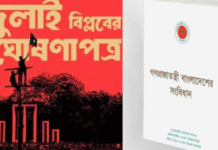Freedom of the press and Prothom Alo
Mystifying metamorphosis of a tragedy

Days ago, the editor of the leading Bangla daily Prothom Alo and a few of his colleagues were forced to secure higher judiciary intervention that ordered law enforcers not to harass or arrest them until the hearing on a bail petition in a lower court. On January 16, a Dhaka court issued arrest warrants for Prothom Alo editor and publisher and nine others in a case that involved the death of Abrar, a ninth-grader. Abrar was electrocuted during the anniversary programme of Prothom Alo’s youth magazine Kishor Alo on November 1 last year. The father of the deceased registered a case on November 5.
All the accused were charged under section 304(A) of the Bangladesh Penal Code. The section deals with deaths caused by a “rash or negligent act”. According to the section, a person may face up to five years in jail if charges are proven against him or her.
The filing of a criminal case against the editor who was not even present at the site of the unfortunate accident has triggered deep anxiety among journalists and rights activists, both at home and abroad. The government and its intellectual cohort insist the family of the deceased is merely exercising their right to seek legal redress for an act that they perceive as criminal negligence. They deny any involvement of the state in the filing of the case. In contrast, many in the press fraternity, rights community and political circles of Bangladesh find reasons to believe that the tragic event has presented itself as a boon to forces that were looking for an excuse to tame the editor of the most widely circulated daily of the country and who stands out among his peers for pursuing independent and impartial journalism under strenuous circumstances.
Various national and international press freedom related and human rights organisations have time and again reiterated that freedom of expression in print, electronic and social media, is under stress in Bangladesh. The arbitrary application of colonial defamation and sedition laws, the Special Powers Act, the Printing Press and Publication Act and the recently framed Digital Security Act hang as Damocles’ sword over the Bangladesh media. The discretionary authority exercised in granting license and advertisements also disrupt the level playing field in a competitive market. Journalists at various levels endure threats and intimidation from the politically influential. On occasions, informal advice from powerful quarters also impede free journalism.
Taking into consideration all these factors, Article 19, the UK based press freedom monitoring agency, in a report marking World Press Freedom Day 2019 noted “Increased intimidation and threats to undermine freedom of expression has continued in Bangladesh… the situation for communicators in Bangladesh is dire”. The regional director of Article 19 states “the kind of violations we are seeing, often totally unprovoked, hampers and limits the work of human rights activists, communication activists, writers, artists and media workers”.
It is under such adverse circumstances the current predicament of Prothom Alo and its editor needs to be assessed. Several factors merit consideration.
Against all odds, Prothom Alo’s pursuit of independent journalism has led it to command the readership of millions of Bangladeshis both at home and abroad. In a polity where professional groups, civil society organisations and the media are in effect fractured along partisan lines, the objective quest for truth followed by this newspaper has earned it ardent admirers who cherish accountability, transparency and the rule of law. The forces that feel threatened by the pursuit of such values find plots and conspiracies in the actions of Prothom Alo and its associates. The November 1, 2019 tragedy is a glaring example.
At a press briefing, the Information Minister informed the media that in the Cabinet meeting of November 4, “several members expressed concern and frustration” over the death of Nayeemul Abrar. They raised questions on whether appropriate security measures were taken. He added that everyone expressed their displeasure that the organisers went ahead with the programme despite the death of the student and wondered why a postmortem was not conducted and the body was laid to rest without following due procedure. The minister assured that investigation would surely reveal if the organisers had defaulted in any way.
In response to the minister’s statement, the editor of Kishor Alo on November 5 stated that in order to ensure physical safety of all the participants, they secured the services of RAB, police and two reputed security companies, set up an emergency medical camp (in which two highly trained doctors were available) and kept an ambulance with intensive care unit facilities on standby. He asserted that thousands of participants would testify that the programme ended even before the hospital authorities pronounced Abrar dead. Therefore, the claim that the cultural programme continued even after the event was not true. The editor further stated that the decision to send Abrar to a particular medical hospital belonged to the attending doctors and that it was Abrar’s guardians who, in an application, informed the police that since it was a case of accident, they did not want any postmortem to be conducted. Quite understandably, it was the family’s decision when and where to bury the deceased. The explanation offered by the editor of Kishor Alo on the minister’s statement clearly establishes the fact that the Cabinet was not appropriately informed about the incident.
It is a matter of extreme regret that young Abrar had died despite such detailed measures being taken to ensure the safety of participants. It is for the court to decide if there was criminal negligence of any quarter. However, the fact remains, on the day of the tragedy the father of the deceased informed the police in a letter that he accepted the death as an accident and it is in that context, he requested that no postmortem be conducted. One is not sure what made him change his decision, although he is surely entitled to that.
The speed and efficiency with which the case report was filed and he arrest warrant issued by the concerned authorities also raise questions. Defence counsel and others have argued that even though the legal proceedings could have continued with the issuance of a summons, in this case, an arrest warrant was issued. It is also worth noting that the warrant was issued only a few hours before the weekly holiday commenced, in which case the opportunity for protection from a higher court was significantly reduced.
At the bail hearing, the state’s vigorous opposition to the suggestion of granting bail to those accused also reinforces the argument that other considerations may be at play. This is because basic jurisprudence informs that an accused is denied bail when he or she is a flight risk (could potentially leave the city and not return for court appearance), is a repeat offender, could pose a threat to others and the crime is severe. In this case, the editor and his co-accused are eminent persons on trial for negligence and the Additional Attorney General representing the state had failed to provide any evidence that they could be a flight risk, repeat offenders and a threat to others.
The selective application of the law has given rise to the belief that the Prothom Alo editor is being unfairly targeted. As law professor Asif Nazrul has argued, if the state really wants the editor of Prothom Alo to account for an accident at an event organised by his enterprise, then should the state not also have investigated and punished the VIP who held back the departure of a ferry that led to the death of a youth in an ambulance or identified and taken action when 10 persons died in a stampede at a religious ceremony organised to mark the death of the former mayor of Chattogram?
The above considerations lead conscientious citizens to believe that some quarters may be using Abrar’s accidental death to stifle and put undue pressure on one of the very few newspapers that carry critical perspectives, publish reports that call for accountability and transparency of state agencies and provide space for dissenting voices. They feel a tragedy be respected as tragedy, and it is time that reason prevails and undue influence on those performing the judicial task ceases.
C R Abrar is an academic and rights worker.









